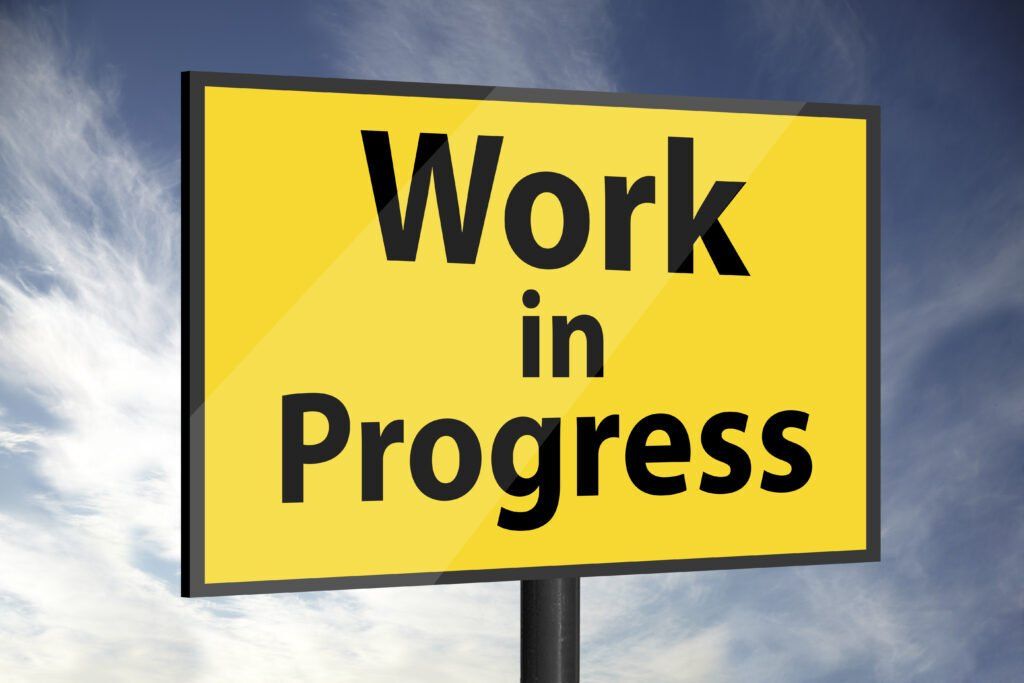Setting up your own Business as a Project Manager
Taking the first step to setting up your own business can be challenging; three are many emotions to contend with from excitement to self-doubt to fear. The more positive emotions are the obvious lure of flexibility, freedom, achievement, and gratification, but do you really achieve these outcomes by setting up your own business?
If you are “successful” it may provide the opportunity to create a lifestyle that you’re looking for, you will be the master of your own destiny and not beholden to an organisation.

Like everything, your career is a work in progress
We look at both perspectives with the intention of providing a balanced view and something to consider before taking the leap into the unknown.
There is a perceived safety net in working 9 – 5. You collect a consistent income every month. With the employment market continuing to evolve, coupled with the impact of technology and dare we say, a global pandemic, it may be the ideal opportunity to take control of your own career.
Project Management can be the ideal skill set for those wanting to set up their own business. A Project Managers’ capability can be utilised by organisations in a modular way. Over the years, we have worked with countless individuals who thought they were immune to being made redundant, in any environment, but particularly in the current climate. There are no guarantees, so does it make it less risky to strike out on your own.
What the ATO says
The ATO says that “The profile of Australian workers is also evolving more generally, with more ‘white-collar’ workers adopting forms of contracting and self-employment in many sectors”.
The evidence is overwhelming that white-collar, high-paid, professionals heavily dominate independent contracting, some of the other defining characteristics tend to be active seekers of information, and above-average income earners, with a high business competency.
The research report by the ATO findings “debunk the popular misconception that workers are forced into setting up their own business due to job loss or lack of alternatives”.
Things to consider before setting up your own business:
Resilience
- You need to have a certain drive and personality to set up on your own.
- Be aware that it is unlikely to be easy and that things will not always go your way. In fact, many things may not go to plan, but you need to have a certain type of character and resilience to be able to keep going.
Mind your health
- All areas of your health. You will invariably work longer and harder than you may have before.
- It will be easy to push things like exercise and mental health to one side as your business becomes your number one priority, but without your health, achieving the former is not possible, remember to take time out for you.
Play to your strengths and employ others for theirs
- You may need assistance outside your core skills. These often fall into the areas of Marketing, Accounting, IT Support, and Sales.
Positioning
- Have you considered how you will position yourself and where you may attain your first client?
Do you have a network?
- You will soon realise that once you are outside an organisation it can get lonely. It is important to have people to talk to, find like-minded communities, and network. We’re not suggesting collecting as many business cards and mobile numbers as you can. Rather work on making meaningful connections.
- Be mindful of possible legal issues and conflicts of interest
- It can be tempting to revert to contracting. You should determine whether you are selling hours or whether you are selling a service as part of a business.
Tips
- Success and achievement look different for everyone, be realistic, be patient, be persistent and set some achievable goals
- Building networks of likeminded people and peers is key. You may need to seek help, you may feel isolated and may just need to talk to someone, it is important to build and maintain networks with other individuals that have complementary skills.
- Set some time aside to reinvigorate – exhaustion is not a guarantee of quality
- Being your own boss means you must dedicate time to working on the business as much as you do in the business
- Think about the business cycle. There is a risk of your business stopping because you are so deeply entrenched in delivering the work and you do not have time to think about where your next project will come from. Remember you are now responsible for sales, marketing, service, and delivery
- Manage your finances. It is advisable to complete a detailed financial plan so that you can manage your cashflow.
Resources
Build your virtual team, these are some reliable resources that are available
https://asic.gov.au/for-business/registering-a-company/steps-to-register-a-company
Try to find reliable professional services such as a Lawyer, an Accountant, Insurance Broker, and IT Support
There are certainly many positives and negatives to setting up your own business. If you are unsure, you may want to test your ideas with a group of trusted friends, colleagues, and even prospective clients. Setting up your own business is a brave decision, one that could reap significant long-term benefits.
Good luck, no matter what path you undertake!



